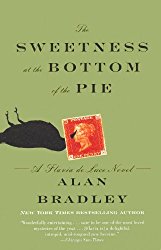This is the first in a series of nine book-length titles (and one short story) recounting the many adventures of Flavia de Luce, aged eleven and a half, in Bishop’s Lacey of rural England of 1950-1951. ‘Flavia’ is pronounced, she has more than one occasion to say, to rhyme with bravia as in bravo.

With pigtails flying, aside her faithful bicycle Gladys, Flavia goes where no plod ventures, under beds, into holes in the ground, inside ovens, over roof tops, through holes in the wall, diving in to muddy ponds, all the while musing on the wonders of chemistry.
It all began early one morning, very early, about 4 am, while she was waiting for an experiment to mature, Flavia discovers in the cucumber patch a dying man. ‘How interesting!’ is her reaction, as he breathes his last.
When plod, duly summoned, shows little interest in her or her observations (which are many) she resolves to get to the bottom of things before plod does. The race is on, but only one of the runners knows it: Flavia.
First stop, the local library, then the local gossips, as she mobilises village resources to identify the deceased and infer his purpose then to find his killer while plod follows police procedure, i.e., drinks tea, calls London, fills in forms, drinks tea, scratches ear, fills up tank of police car with petrol, rests, and goes home.
The cast of characters includes a largely silent Father, who occupies himself most hours behind closed doors with stamp albums. There is a bounded retainer, Dogger, whose emotional frailty is debilitating. Father and Dogger spent long years in Japanese prison camps, and in different ways have never recovered from it. Harriet, wife and mother, died just before the war, leaving a very large gap. Though gone for a decade she remains a presence in Buckshaw, the decaying family pile. At the mere mention of Harriet’s name, Father faints. Meanwhile, Dogger cowers in the greenhouse with his demons. Mrs Mullen does for them and provides a pipeline to the village and sanity.
Older sisters Ophelia, the narcissistic musician, and Daphne, the bespectacled reader, round out the ensemble cast. Rivalry among the three sisters has become Total Sibling War.
The Molochs of Inland Revenue undermine Buckshaw with questions, writs, and invoices. Harriet died without a will, leaving questions of property much vexed. Four years in a Japanese prison camp did not break Father, but Inland Revenue seems about to do so. He could satisfy these meat eaters by selling her jewels (valuable), books (rare), and automobile (handmade) but this he resolutely refuses to do, as if by keeping them he keeps her.
That Flavia is the very image of Harriet explains why Father can hardly look at her, though she does not understand this and feels slighted. Father and Harriet were cousin and he knew her at Flavia’s age.
I gulped down the nine books of the sequence, one-after-another, each a delight. Flavia does not always understand what she sees or hears or is said to her, and she makes mistakes. Nevertheless she has the optimism, audacity, energy, and determinism to overcome all obstacles, including those of her own making. When all else fails, when she is totally desperate, when there is no alternative, she will even tell the truth!
The plotting is neat, details play into the larger picture in due course. There are no superfluous asides and backstories. The characters are delightful, most of all the star of the show, Flavia, but also Dogger, Mrs Mullen, the Vicar, and the Weird Sisters, and more. While Flavia makes the snap judgements of youth, time and experience cause her to change her mind more than once. Call that growing up.
There is much chemistry. Like many a prepubescent girl, Flavia keeps scrap books. In her case they consist of newspaper and magazine cuttings of homicides by poisoning. She got kicked out of the Girl Guides when for a home science project she distilled arsenic from house cleaning products. On the wall of her room are autographed pictures of many chemists, particularly those whose work expanded knowledge of poisons. She has longterm plans for the Weird Sisters.
There are some false notes now and again, and the one book set in Canada at boarding school seemed somehow lesser, though it has some great moments, the whole is less than the sum of its parts.
Neither Amazon, Wikipedia, nor the author’s web page offers a simple chronological list of the titles in the series. Below is my effort to supply that list.
‘The Sweetness at the Bottom of the Pie’ (2009).
‘The Weed That Strings the Hangman’s Bag’ (2010).
‘A Red Herring Without Mustard’ (2011).
‘I Am Half-Sick of Shadows’ (2011).
‘Speaking from Among the Bones’ (2013).
‘The Dead in Their Vaulted Arches’ (2014).
‘The Curious Case of the Copper Corpse’ (2014) (a short story).
‘As Chimney Sweepers Come To Dust’ (2015).
‘Thrice the Brinded Cat Hath Mew’d’ (2016).
‘A Grave’s a Fine and Private Place’ (2018).
 Alan Bradley. Chapeux!
Alan Bradley. Chapeux!
I first espied one of these titles (‘As Chimney Sweepers Come To Dust’) in the English-Language section of a bookstore in Helsinki in 2016 and when I got back to it, I found it had predecessors so I started with the first, reading on the Kindle, and the banquet began. Now sad to say I have read them all, but fear not for I have returned to this, volume one, and started over. ‘As Chimney Sweepers Come To Dust,’ by the way, was the one I saw in Helsinki and I am glad that I did not start there as I might have then stopped, this being the one set in Canada as referred to above.
Dare we readers hope Flavia will continue her chemical ways in adolescence and adulthood?
Skip to content
